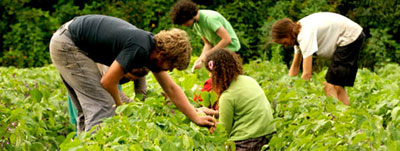Massachusetts’ Hampshire College, long known for progressive leadership, has decided to see if it can source 100% of the food served on campus locally.
All food, sans a few items that can’t be grown locally – like coffee and citrus fruits – will be purchased from sources within 150 miles of campus.
The college has its own farm and its food service provider Bon Appétit, bought 40 shares in local Community Supported Agriculture (CSA) farms.

"Thinking about the political, economic, and environmental implications of how we produce, transport, and consume food is a good way to get at broader questions of sustainability," says Jonathan Lash, President of Hampshire College.
"This transformation will allow us to elevate the current discourse on sustainable food procurement, reduce our carbon footprint, and ultimately empower our students to be informed leaders in considering the food systems of the future."
A $50,000 grant from the Kendall Foundation will be used to build collaborative networks with local farmers and a variety of community agricultural organizations like the Real Food Challenge, Community Involved in Sustaining Agriculture (CISA), Pioneer
Valley Grows, and the Food Bank of Western Massachusetts.
"We chose to support this initiative at Hampshire because colleges are key levers for change in the food system," says Andrew Kendall, Executive Director of the foundation. "They can have a meaningful impact on production and consumption of local food through their purchasing capacity. Longer-term benefits result from the learning and engagement of students, faculty, and the broader community."
The Henry P. Kendall Foundation is dedicated to building a healthy food system in New England that increases production and consumption of local, sustainably produced food.
Bon Appétit, known for its "deep-green" principles, is working with Hampshire to create regional opportunities for preserving and processing regional foods. They are also exploring various ways to expand the growing season at Hampshire’s farm.
A 3,000-square-foot organic garden at San Francisco’s Giants stadium is the brainchild of Bon Appétit.
Hampshire has long-term plans to create the Center for New England Food and Agriculture, where its land, innovative curriculum, and farming
expertise, would be turned into a hub for local agriculture, bringing farmers together with other colleges in the area. They would work together on research,
sustainable agriculture apprenticeships, and cross-institutional
initiatives on local food sourcing.
Hampshire College was the first university to divest from South Africa in 1977 and is again leading the nation by divesting from investments in fossil fuels. It often appears on Sierra Club’s Cool Schools List.
In the last few years, we’ve seen a growing infrastructure that supports local food: an online distribution hub; online farmers markets, food hubs that connect farmers, buyers, and distributors, and a company that builds greenhouses attached to supermarkets. We’ve even seen the advent of community fisheries. The Locavore Index tracks the growth of local food systems in the US.

Contact me in feb/mar and I can send you all the citrus you could want. In my neighborhood.
It’s great that Hampshire is putting more emphasis on local.
It’s also very concerning that they use the term “100%” but then go on to make exceptions: “All food, sans a few items that can’t be grown locally – like coffee and citrus fruits – will be purchased from sources within 150 miles of campus.” 100% is a completely worthless term if there are exemptions. What about tomatoes in winter? It’s hard to get those locally. What about grass fed lamb in large enough volume? Maybe it’d be tough to get that locally too. And how about wheat, or rice, or pretty much anything?
This challenge is a great idea, but only holds meaning if the commitment is respected. 100% is a very blunt and demanding ratio. If Hampshire doesn’t mean this, they absolutely shouldn’t say it.
100% can be done. There’s a dorm at Middlebury that used to do it [and maybe still does]. They used walnut oil instead of olive oil, because it was the only oil they could source locally. They used maple sugar instead of cane sugar, for the same reason. 100% takes some significant dietary change in comparison to the conventional New England diet of this era. But it is very achievable. I urge Hampshire to hold steady to this 100% commitment.